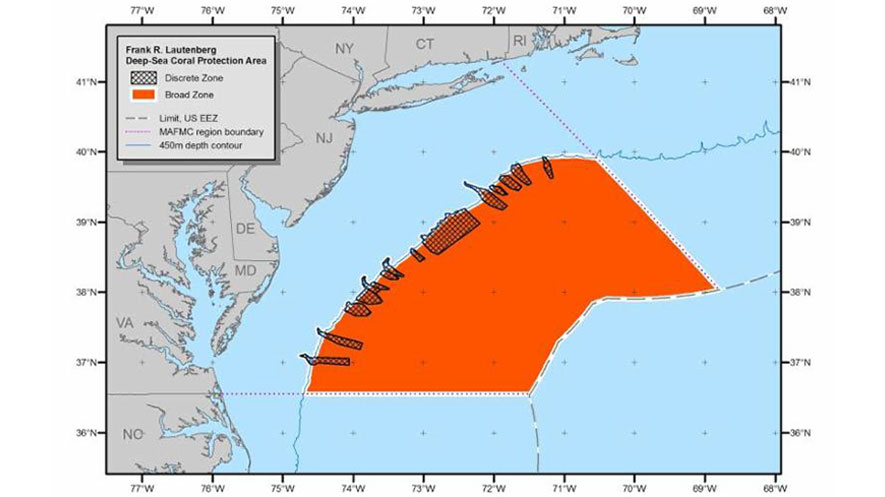NOAA Fisheries and the Mid Atlantic Fishery Management Council have announced publication of the final rule for the Mid-Atlantic Fishery Management Council's action to designate a large offshore protected area for deep sea corals in the Mid-Atlantic.
The Council approved the Deep Sea Corals Amendment to the Mackerel, Squid, Butterfish Fishery Management Plan in 2015 in order to protect deep sea corals from the impacts of bottom-tending fishing gear.
Most deep sea corals are slow-growing and fragile, making them vulnerable to damage from certain types of fishing gear that contact the sea floor. This final rule designates a large "deep sea coral zone" in areas where corals have been observed or where they are likely to occur. Under the Magnuson-Stevens Act (MSA), regional fishery management councils have the discretionary authority to designate zones where fishing may be restricted to protect deep sea corals. Although corals have been protected as essential fish habitat, the Mid-Atlantic Fishery Management Council is the first of the eight U.S. regional fishery management councils to use this discretionary authority.
The Council named the protected area in honor of the late Senator Frank Lautenberg, a five-term United States senator from New Jersey who was responsible for several important pieces of ocean conservation legislation, including the MSA provisions allowing for deep sea coral protections. The Frank R. Lautenberg Deep Sea Coral Protection Area encompasses areas of known or highly likely coral presence in underwater canyons or slope areas along the continental shelf edge, as well as deeper areas where the presence of corals is uncertain, but where little or no fishing effort currently occurs. In total, the coral zone encompasses more than 38,000 square miles of federal waters off the Mid-Atlantic coast, an area approximately the size of the state of Virginia.
Within the protected area, commercial fishermen are prohibited from using most types of bottom-tending fishing gear such as trawls, dredges, bottom longlines, and traps. The rule does not apply to recreational fishing, commercial gear types that do not contact the sea floor, or the American lobster trap fishery. An exemption is also provided for the deep sea red crab commercial trap fishery. Vessels may transit through the area if fishing gear is stowed and not available for immediate use.
Development of the deep sea coral protection area was informed by several recent scientific research efforts undertaken by the National Oceanic and Atmospheric Administration and the Bureau of Ocean Energy Management, including several deep sea surveys and the development of a predictive deep sea coral habitat suitability model. Using this information, members of the Council's advisory panels, deep sea coral experts, fishing industry members, and other stakeholders cooperatively reviewed this information to identify the landward boundaries for the protected area.
"This is a great story of regional collaboration among the fishing industry, the Mid-Atlantic Council, the research community, and environmental organizations to protect what we all agree is a valuable ecological resource," said John Bullard, Regional Administrator for the Greater Atlantic Regional Fisheries Office.
"The Mid-Atlantic Council is extremely pleased that NOAA Fisheries has approved the Council's recommended protection of deep sea corals in the Mid-Atlantic," said Council chairman Michael Luisi.
For more information on this action, read the rule as published in the Federal Register, the permit holder bulletin for commercial fishermen, and this 2015 web story.
You can find the boundaries of the Frank R. Lautenberg Deep-Sea Coral Protection Area on the GARFO GIS Website and the NOAA GeoPlatform.






